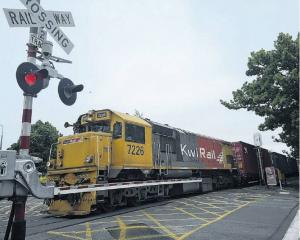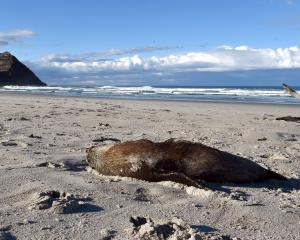The dangers of the bush provided food for thought for a large block of forestry workers yesterday.
More than 200 Wenita forestry staff and contractors were sent off to their first day of work in 2014 with full stomachs and a message to be careful out there.
The breakfast was held to remind staff of the inherent dangers in the forestry industry, Wenita Forest Products chief executive David Cormack said yesterday.
''Last year was an extremely disappointing year for accidents in the industry and we wanted to take the initiative,'' Mr Cormack said.
''Forestry is a high-hazard industry, but there are certainly ways of reducing those hazards. Everybody who goes into our forests should expect to go home unharmed at the end of the day.''
Forestry is New Zealand's most dangerous profession - 10 workers were killed and 90 seriously injured last year.
Last year's deaths included Otago forestry worker Mark James Rogan (45), who died from an infection caused by being struck in the throat with a piece of wood, in an accident at the Tokoiti Forest, in Milton, on May 6 last year.
''Fatalities aren't that common in these parts,'' Mr Cormack said.
''We have a strong safety focus here and our guys are all highly-trained, professional people who take a lot of pride in their careers.''
The sector had an average five fatalities a year over the past six years and 31 forestry workers have been killed and more than 900 seriously injured since 2008, according to the Chief Coroner's Office.
A New Zealand forestry worker is six times more likely to die at work than a British forestry worker and twice as likely as an Australian forestry worker.
An independent review led by the industry and unions is due to start next month.
"We'll be very keen to see the results, and any recommendations for the industry, from that,'' Mr Cormack said.
A WorkSafe New Zealand assessment of cable hauling operations since August had uncovered ''some alarming systemic issues in this industry'', acting chief executive Geoffrey Podger said yesterday.
''There's a problem in this industry and it won't be solved until everyone's on the same course with the regulator. From 162 visits now done, we've had to take enforcement action 203 times; including shutting down 15 operations because of imminent danger of injury or death.''
The Council of Trade Unions has accused the Government of ''turning a blind eye'' to safety in the forestry industry and called for regulation of hours of work, training, wages, poor weather provisions and fatigue.
Bay of Plenty coroner Wallace Bain will also hold inquests into five forestry deaths in March, with the aim of exposing systemic problems in the industry.
While agreeing the safety record in the forestry sector was ''unacceptable'', Labour Minister Simon Bridges has ruled out an inquiry and, instead, called on forest managers to take more responsibility for safety through their entire supply chain.
WorkSafe NZ said there were ''significant lessons'' for the industry, after Complete Logging Ltd was fined $60,000 in the Rotorua District Court yesterday.
The company was also ordered to pay $75,000 reparation for health and safety failings, after forestry worker Robert Epapara (23) was killed by a tree felled by a colleague in the Waione Forest near Lake Rotoiti on March 26 last year.
''Forestry companies must apply the approved code of practice for forest harvesting. If Complete Logging Ltd had applied it, the chances are Mr Epapara would be here today,'' health and safety operations general manager Ona de Rooy said yesterday.
''We will also be meeting all forestry companies over the coming weeks to determine how they're managing safety issues with their contractors. We will be forcefully reminding them that they have duties to ensure contractors are putting the safety of their men first.''
Each year, an average of 75 people die and 6000 suffer serious injury in New Zealand workplaces.
Forestry deaths 2013
January 11: Eramiha Pairama (19), struck by a tree near Whakatane.
January 17: John Sanderson (40), struck by a branch, Whangarei.
February 18: Robert Thompson (43), hit in head when rope snapped, near Thames.
March 26: Robert Epapara (23), crushed by tree, near Rotorua.
April 22: Adam Olsson (23), struck by falling tree, near Waitara.
May 6: Mark James Rogan (45), struck in throat by piece of wood, Tokoiti Forest, Milton.
July 19: Charles Finlay (45), struck on head by a shard of log, northeast of Taupo.
November 26: David Charles Beamsley (63), died in logging accident, near Murupara.
November 29: Michael Langford (28), pinned between logs, near Nelson.
December 19: Lincoln Kidd (20), struck by falling tree, near Levin.
Advertisement













